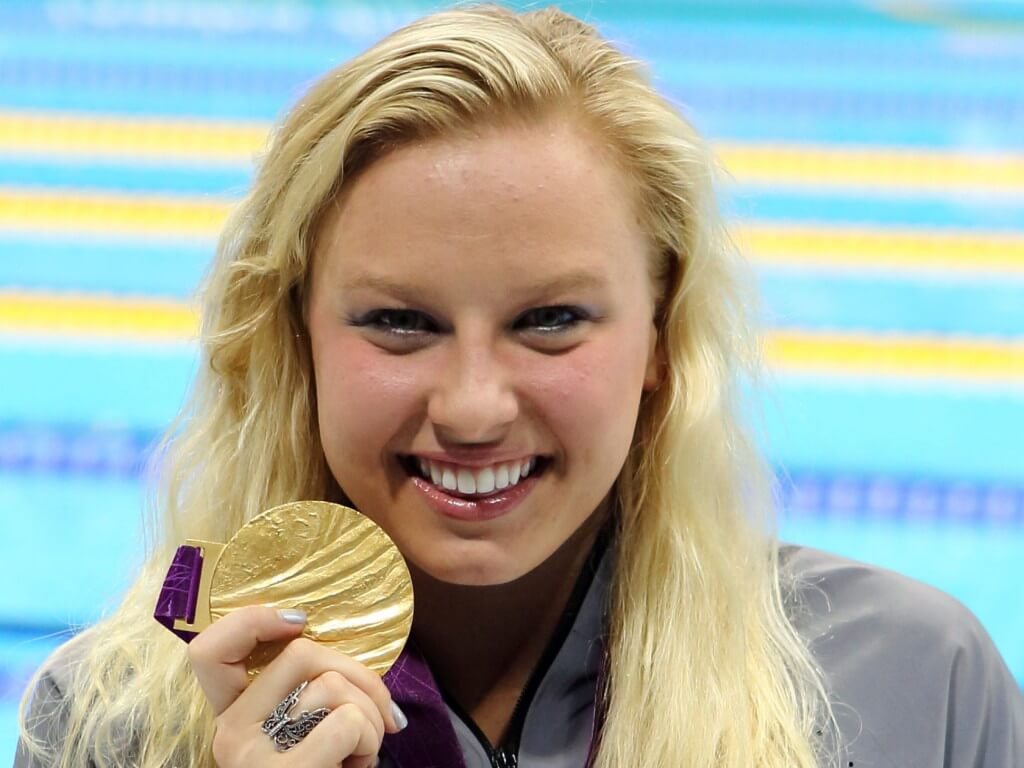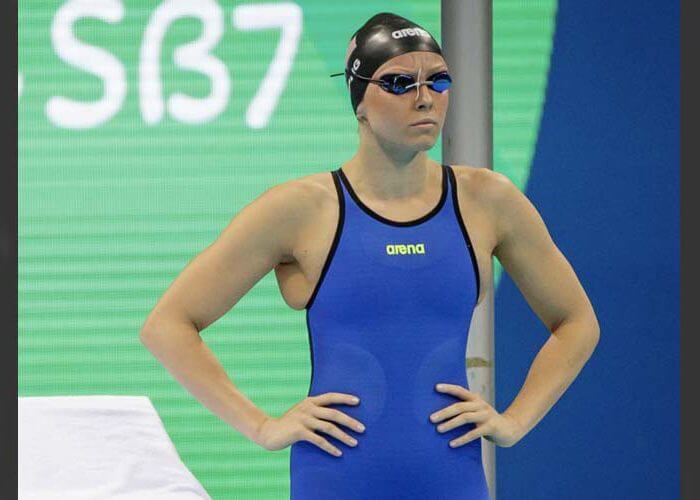Jessica Long On The Poison Pool In Paralympic Swimming Where ‘Classification Cheats Prosper’

Under the headline “Dirty Pool at the Paralympics: Will Cheating Ruin the Games?” Sports Illustrated, through the work and words of Robert Sanchez, today shines a super trouper on the darkest corner of Paralympic swimming: classification cheating.
SI sets up Sanchez’s stall and excoriating trawl of a troubled realm with this:
“The Paralympics are hugely inspirational—and, increasingly, big business. With more money at stake, more athletes are finding ways to cheat the system to win. Heading into Tokyo, legendary U.S. swimmer Jessica Long says it’s time to fight back.”
Long, who was the youngest Team USA athlete at the 2004 Paralympic in Athens, has a pantheon of fine achievement to her name. Her against-the-odds story is more than moving and the stuff of dreams for sellers of the “Olympic spirit and what it can teach us all”.
Born in Russia, as Sanchez tells it, “without most of the bones in her feet, ankles or fibulas, she was left at a Siberian orphanage at 13 months. Steve and his wife, Beth, adopted her – and a boy – shortly afterward, taking them home to Maryland. Jessica had both legs amputated below the knee before her second birthday, though her father has come to think she also gained something important that day.”
Fast-forward, much work, many dreams and a heap of medals later and we find Sanchez writing this in the telling of his 4,500-word feature:
“There is a cheating epidemic within the Paralympic movement, Long and her allies say, an outbreak of para-athletes who are faking or playing up the significance of their disabilities to be grouped with less able-bodied competitors, making it easier to win medals—and money and influence. While para-sport cheating is not new—Spain was stripped of its intellectual disability gold medals from the 2000 Games after nearly all the team’s players were found to have no disability, and allegations have been levied in para-track and field—the furor around swimming has grown so intense that, heading into the 2020 Games this summer in Tokyo, it threatens to tear the sport apart.
Long says that she has overheard coaches talking to swimmers about tanking assessment races. Other swimmers have called out cheating. At least one high-profile coach has done it on Twitter. Parents of para-swimmers break down competitors’ social media videos, Zapruder-like, studying foot falls and arm placements during walks and workouts, hoping to catch a giveaway. In September, the Irish para-swimmer Ailbhe Kelly abruptly announced her retirement at age 20, citing frustrations with the classification system. Early this year former world champion Amy Marren also left Paralympic swimming, writing in a social media post that “there is a long way to go before it becomes a level playing field.”
“I don’t want to seem like a poor sport,” Long says, sitting inside an office just off the pool at the Olympic Training Center one morning this winter in Colorado Springs. She’s 27 and recently married, with 23 Paralympic medals, an autobiography, three ESPY awards, and sponsors that include Toyota and the swimwear maker Arena. “But I can’t watch this sport that I love continue to get destroyed like this,” she says. “All of this is happening on a world stage, and no one in charge is doing anything about it.”
A member of the U.S. Olympic & Paralympic Committee’s media staff is sitting along a nearby wall, pecking out a message on a cellphone. Long hesitates, looks sideways at her. The swimmer closes her eyes and wipes a shock of electric-blond hair from her face. She exhales deeply.
“If I don’t say something,” Long says, “then who is going to stand up for the rest of us?”
Long is not the only one pointing out inconsistencies – and getting lambasted and ever ostracised for doing so. The 2015 reigning U.S. Paralympic coach of the year, Brian Loeffler, was removed from Team USA’s ‘travel list’, Sanchez writes, after he publicly accused 16-year-old Australian swimmer Maddison Elliott of tanking a race to get a more favorable classification. Australia’s Lakeisha Patterson is also among swimmers accused of cheating, alongside the coaches and managers behind the national Para-swimming program, according to official complaints to the IPC seen by Swimming World.
Then there was former U.S. Paralympian Ian Silverman, who in 2016 accused Australian, British and Ukrainian swimmers of intentionally misrepresenting their abilities. In Britain and Australia, funding policies are based on medals won, the performance environment incentivised accordingly.
And who can forget the news of October 2013 when a former Spanish basketball boss was found guilty of fraud 13 years after he presided over one of the biggest scandals in sporting history. Fernando Martin Vicente, the former head of the Spanish Federation for Mentally Handicapped Sports, fielded athletes with no disabilities at the 2000 Paralympics in Sydney in order to win the gold medal. A Madrid court fined him €5,400 and ordered him to return €142,355 in government subsidies which the federation received for the athletes without disabilities.
The scandal broke in November 2000, when Carlos Ribagorda, a member of Spain’s gold medal-winning intellectually handicapped basketball team in Sydney, claimed that he and other athletes in categories such as track and field, table tennis and swimming were not mentally deficient.
“Of the 200 Spanish athletes at Sydney at least 15 had no type of physical or mental handicap – they didn’t even pass medical or psychological examinations,” he wrote in Capital magazine just days after the Paralympics ended. Ribargorda said he had played for the Spanish Paralympic basketball team for over two years but had no mental handicap.
He said the only test he had been asked to complete at his first training session was six press-ups, after which his blood pressure was taken, nor did he face an intelligence test when he was in Australia for the Sydney 2000 Paralympics.
Fake medical certificates in the mix, the scandal is still playing out to this day, the International Paralympic Committee (IPC) still in talks with governors of Wheelchair Basketball, a sport currently cut out of the 2020 and 2024 Paralympics until it can prove it has its classifications processes under control to IPC satisfaction.
Swimming has faced IPC scrutiny, too, but “not nearly enough”, a source told Swimming World as part of research into work yet to come to fruition.
Observers of paralympic swimmers have collated vast numbers of videos of “suspect” athletes who they believe to be faking their disability in order to be placed in a more ‘favourable’ classification that turns them from also-swams into multiple champions, all encouraged by coaches and federations whose funding models depend on the delivery of medals.

Jessica Long – Photo Courtesy: Arena
Big Business – & Reform Promised
Sanchez points out that “Paralympic sport has grown into big business”. U.S. Paralympians this year will receive $37,500 for each gold medal they earn, $22,500 for silver and $15,000 for bronze. That’s a five-fold increase from Rio 2016 and delivers parity of reward for Olympian and Paralympian.
The author opines: “The reality is, that, even under the best circumstances, it’s a Herculean task to neatly sort athletes with diverse physical abilities into 10 categories. Accusing a competitor of intentionally misrepresenting their condition is incredibly fraught—and potentially damaging.”
Julie Dussliere, the USOPC’s Chief of Paralympic Sport, tells Sanchez that “there isn’t a mechanism for an overnight fix. Athletes, she says, will have to be patient as World Para Swimming works to better understand how different disabilities impact performance, a process that could take years. Says Dussliere:
“I’m confident that the IPC is working with World Para Swimming, as they are with many other international federations, to ensure that the playing field is as fair and level as it can be at the international level.”
Meanwhile, the likes of Long and a growing number of others believe the fight needs to be brought to help to hasten any review and reform process. Sanchez let’s Long have the last word – and that isn’t short on competitive spirit: “I have to know that I’m fighting for something that’s much bigger than me. The Paralympics have given me so much, and I know what this sport can do for a young kid when it’s at its best.”
Visualisation is a part of Long’s preparation for Tokyo – and she intends to use the fight for fairness as a tool in her motivational kit box:
“That’s the thing motivating me across the pool,” she says. “I close my eyes, and I can see them. I just really want to kick some asses.”



